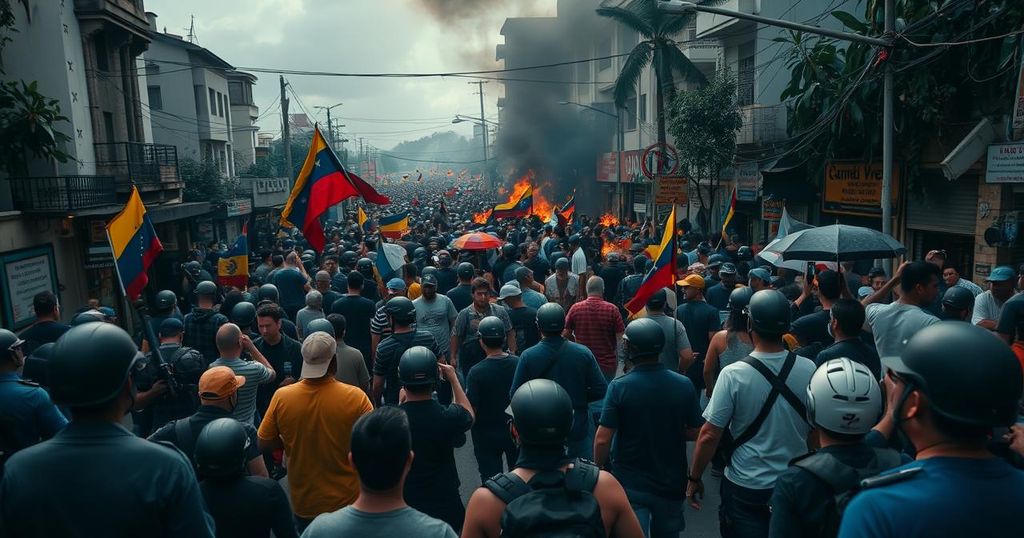The United Nations has condemned Nicolás Maduro’s government for serious human rights violations following the disputed July presidential election, documenting killings, torture, and forced disappearances orchestrated by state security forces. The report notes that violence was instigated at the highest levels of the regime, leading to an acute crisis characterized by widespread abuse, particularly against minors and dissenters. With numerous arrests and brutal treatment of protesters and minors, the government’s actions represent a major escalation in human rights repression in Venezuela.
Post-election violence in Venezuela has escalated dramatically, revealing serious human rights violations according to a new report from the United Nations (U.N.). Following the disputed presidential election held in July, Nicolás Maduro’s government has been implicated in numerous atrocities, including killings, forced disappearances, and severe instances of torture perpetrated by state security forces. The U.N.’s Independent International Fact-Finding Mission released a troubling 161-page document that accuses the Maduro regime of reactivating its repressive mechanisms to quash dissent following the election, resulting in one of the country’s most significant human rights crises in recent memory. The findings state that these violent actions can be traced back to the highest levels of civilian and military leadership, particularly implicating President Maduro himself. Officially reported deaths include at least 25 individuals, including minors, the majority being attributed to either government security forces or state-supported armed groups. Additionally, a sizable number of Venezuelans have suffered injuries, arbitrary arrests, and forced disappearances in the aftermath of the election, many of which occurred without due process as warrants were often overlooked. Detainees were frequently subjected to torture meant to extract false confessions involving accusations of serious crimes such as terrorism and treason. The methods used were heinous, including not only physical beatings but also psychological and sexual torture, thus highlighting the gravity of the situation. Among the affected were 158 minors, underscoring the reach of the government’s brutal crackdown. These minors were often detained without their families being informed, experiencing threats and abuse within the confines of detention centers. Accounts of maltreatment include a 16-year-old boy suffering beatings over the course of a week, and another minor left with severe injuries, including broken bones. The electoral environment leading up to these events was already fraught with tension, with widespread suspicion regarding the legitimacy of the election results. Although the National Electoral Council declared Maduro the victor, evidence presented by opposition groups suggested that he had actually lost to Edmundo González, who has subsequently been recognized as the legitimate winner by several countries, including the United States. Prior to the elections, the Maduro government actively suppressed any dissenting opinions and intensified its actions post-election under a campaign known as “Operation Tun Tun,” which involved the surveillance and marking of protester residences. Detainees often included individuals who merely expressed discontent with the government’s electoral conduct. It is crucial to note that the report states its findings only reflect “a sample of a much larger universe of crimes” committed by the Venezuelan regime, indicating the systemic nature of these violations.
The context of this report stems from the July presidential election in Venezuela, which was highly contested and marked by allegations of fraud and manipulation. Nicolás Maduro’s administration faced widespread criticism for its handling of the electoral process and the subsequent suppression of dissenting voices. Following the election, various human rights organizations and international bodies, notably the United Nations, scrutinized the government’s actions, leading to findings of severe abuses against civilians, particularly targeting opposition members and protesters. This situation reflects a broader pattern of political repression seen in Venezuela in recent years, raising alarms among global human rights advocates about the deteriorating state of civil liberties in the country.
In conclusion, the United Nations report detailing the aftermath of Venezuela’s presidential election underscores alarming human rights abuses perpetrated by the Maduro government. With a clear documentation of extrajudicial killings, torture, and arbitrary detentions, the findings reflect both the scale and severity of the ongoing repression in Venezuela. The implications of these actions extend beyond individual violations, presenting a grave threat to the rule of law and basic human rights in the country, as the regime systematically aims to eliminate dissent and maintain a grip on power.
Original Source: reason.com







